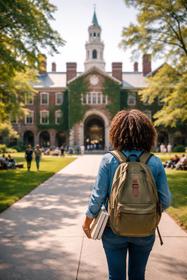- The College of Southern Maryland (CSM) is an open-admissions, regional community college preparing students and community to meet the challenges of individual, social and global changes. CSM makes accessible a broad range of affordable, high-quality learning opportunities that allow students to define and achieve their goals, enhance their knowledge, and make smooth transitions at various stages of their development.
School Highlights
College of Southern Maryland serves 7,707 students (26% of students are full-time).
The college's student-teacher ratio of 14:1 is higher than the state community college average of 12:1.
Minority enrollment is 54% of the student body (majority Black), which is less than the state average of 63%.
Quick Facts (2026)
- Enrollment: 7,707 students
- In-state tuition: $5,845
- Out-state tuition: $7,557
- Student-teacher ratio: 14:1
- Minority enrollment: 54%
- Source: Integrated Postsecondary Education Data System (IPEDS)
School Overview
The teacher population of 570 teachers has stayed relatively flat over five years.
College of Southern Maryland
(MD) Community College Avg.
Carnegie Classification
Associate's Colleges: High Transfer-Mixed Traditional/Nontraditional
Associate's Colleges: High Transfer-Mixed Traditional/Nontraditional
Institution Level
At least 2 but less than 4 years
At least 2 but less than 4 years
Institution Control
Public
Public
Total Faculty
570 staff
446 staff
School Calendar
Student Body
The student population of College of Southern Maryland has grown by 25% over five years.
The student-teacher ratio of 14:1 has decreased from 29:1 over five years.
The College of Southern Maryland diversity score of 0.68 is less than the state average of 0.75. The school's diversity has grown by 20% over five years.
Total Enrollment
7,707 students
5,610 students
Student-Teacher Ratio
14:1
12:1
# Full-Time Students
2,032 students
1,128 students
# Part-Time Students
5,675 students
4,482 students
# Enrollment Undergraduate
770 students
319 students
# Full-Time Undergraduate Students
2,032 students
1,128 students
# Part-Time Undergraduate Students
5,675 students
4,482 students
% American Indian/Alaskan
n/a
n/a
% Asian
4%
7%
% Hispanic
9%
13%
% Black
28%
30%
% White
46%
37%
% Hawaiian
n/a
n/a
% Two or more races
8%
5%
% Non Resident races
1%
5%
% Unknown races
4%
3%
Diversity Score
0.68
0.75
College Completion Rate (Students who graduate in less than 4 years)
32%
28%
Average Graduate Earnings (10 Years)
$41,000
$36,700
Tuition and Acceptance Rate
The public in-state tuition of $5,845 is more than the state average of $5,633. The in-state tuition has declined by 14% over four years.
The public out-state tuition of $7,557 is less than the state average of $7,892. The out-state tuition has declined by 14% over four years.
In-State Tuition Fees
$5,845
$5,633
Out-State Tuition Fees
$7,557
$7,892
Tuition Notes
$140 per credit for in-county residents
% Students Receiving Some Financial Aid
57%
72%
Median Debt for Graduates
$9,000
$10,000
Median Debt for Dropouts
$5,500
$5,500
Acceptance Rate
n/a
100%
Source: 2024 (or latest year available) Integrated Postsecondary Education Data System (IPEDS)
School Notes
- The College of Southern Maryland is rich in history with a promising and exciting future ahead. The college's history dates to 1958 when the Charles County Community College was established as part of the continuing expansion of the community college within America. At its inception in 1958, the college was governed by the Charles County Board of Education, with the first classes being held at La Plata High School in the evenings. The Friendly Hall Campus, which is now the La Plata campus, was established in 1968. The college expanded its services to St. Mary's County in 1978 and Calvert County in 1980. The College of Southern Maryland is accredited by the Middle States Association of Colleges and Schools and others. The college offers Associate (Transfer and Terminal) Degrees and Certificate in more than 120 programs. CSM contributes to the well being of the region by providing an array of associate degree and certificate programs; enhanced access to bachelor degree programs; workforce development and job training; corporate consulting; leadership and community development; wellness, fitness and personal enrichment opportunities, and cultural experiences. CSM operates four campuses in the tri-county area. The La Plata Campus, nestled on 173 wooded acres off of Mitchell Road and the Waldorf Center for Higher Education on Old Washington Road, are both located in Charles county. The Prince Frederick Campus is located in Calvert County, and the Leonardtown Campus is situated in St. Mary's County. The La Plata Campus hosts a variety of amenities, including large indoor pool, fine arts center with a 400-seat theater, high-tech computer laboratories, outdoor and indoor sports facilities, bookstore fitness center, cafeteria, distance learning center and state-of-the-art conference center.
- Sample of notable school alumni/alumnae:
- Troy D. Berry ‘91, Sheriff, Charles County -
- Toni Kruszka '11, Director II, Development, College of Southern Maryland -
- Alisa Casas ‘13, Communications Director, St. Mary’s County Government -
Frequently Asked Questions
How much does College of Southern Maryland cost?
College of Southern Maryland's tuition is approximately $5,845 for In-State students and $7,557 for Out-State students.
Who are famous alumni from College of Southern Maryland?
College of Southern Maryland famous alumni include: Troy D. Berry ‘91, Sheriff, Charles County, Toni Kruszka '11, Director II, Development, College of Southern Maryland and Alisa Casas ‘13, Communications Director, St. Mary’s County Government.
Recent Articles

Community College Rankings by Category 2026
Explore the 2026 community college rankings by category, including affordability, transfer success, online programs, and workforce outcomes.

Most In-Demand Community College Majors for 2026
Discover the most in-demand community college majors for 2026, including healthcare, tech, skilled trades, and business programs with strong job growth.

From Community College to Ivy League: Is It Possible?
Can students transfer from community college to the Ivy League? Explore pathways, data, 2026 trends, and expert insights.









